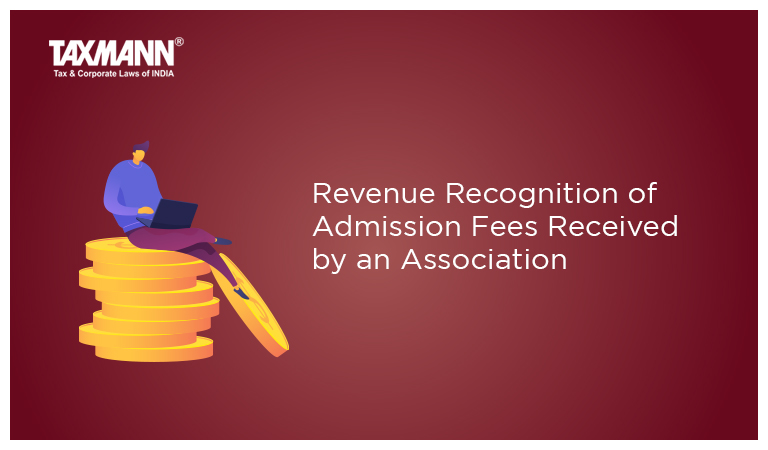Revenue Recognition of Admission Fees Received by an Association
- Blog|Account & Audit|
- 3 Min Read
- By Taxmann
- |
- Last Updated on 7 October, 2022

Table of Contents
1. Query
3. Conclusion
1. Query
An Association was registered under the XYZ Societies Registration Act, in the year 2003 to promote sports activities. It is regulated by the Memorandum of Rules and regulations framed thereunder. It receives applications for membership along with ‘one-time payment’ of entrance fee for which membership is confirmed subject to vacancies in the association. The member enjoys rights and privileges as per the category of membership to which he has applied.
The entrance fee received by the association is treated as a liability until the application is converted to confirmation of membership. When the membership is confirmed, such an amount is capitalized and transferred to Capital Fund.
Whether the accounting treatment followed by the association is in accordance with the principles prescribed under relevant accounting standards?
2. Relevant Provisions
Paragraph 49 (b) of the ‘Framework for the Preparation and Presentation of Financial Statements‘, issued by the Institute of Chartered Accountants of India, defines the term, ‘liability’ as
“A present obligation of the enterprise arising from past events, the settlement of which is expected to result in an outflow from the enterprise of resources embodying economic benefits”
Accounting Standard (AS) 9, Revenue Recognition, states that in a transaction involving the rendering of services, performance should be measured either under the completed service contract method or under the proportionate completion method, whichever relates the revenue to the work accomplished. Such performance should be regarded as being achieved when no significant uncertainty exists regarding the amount of the consideration that will be derived from rendering the service.
Read More About Accounting Standards (AS)
3. Conclusion
It is concluded that the association is under an obligation to refund the entrance fee received in advance in case the membership is not confirmed or rejected, which results in an outflow from the enterprise of resources embodying economic benefits. Therefore, the entrance fee received in advance meets the characteristics of liability till the decision of granting a membership is taken.
Further, the recognition of revenue depends on the nature of the services being provided and the timing of the performance of such services. Thus, it becomes necessary to determine whether a member is receiving goods and services or any other rights or privileges in the capacity of an owner or in the capacity of customers. Where the entrance fee is received in the capacity of owners then the same shall be as a contribution to capital by the owner and would not be considered as revenue from customers. But, where it is determined that the entrance fee from any membership category is a combination of ownership and revenue transaction, a portion of the entrance fee should rationally and systematically be recognized immediately as a contribution of ‘Capital from an Owner’ and another portion should be recognised as revenue on a systematic and rational basis.
References
– EAC opinion Query 10, Volume 40- Part II
– Opinion finalized on 29.10.2020 and 30.10.2020
– AS 9
Dive Deeper:
Revenue Recognition under Accounting Standard 9
Disclaimer: The content/information published on the website is only for general information of the user and shall not be construed as legal advice. While the Taxmann has exercised reasonable efforts to ensure the veracity of information/content published, Taxmann shall be under no liability in any manner whatsoever for incorrect information, if any.

Taxmann Publications has a dedicated in-house Research & Editorial Team. This team consists of a team of Chartered Accountants, Company Secretaries, and Lawyers. This team works under the guidance and supervision of editor-in-chief Mr Rakesh Bhargava.
The Research and Editorial Team is responsible for developing reliable and accurate content for the readers. The team follows the six-sigma approach to achieve the benchmark of zero error in its publications and research platforms. The team ensures that the following publication guidelines are thoroughly followed while developing the content:
- The statutory material is obtained only from the authorized and reliable sources
- All the latest developments in the judicial and legislative fields are covered
- Prepare the analytical write-ups on current, controversial, and important issues to help the readers to understand the concept and its implications
- Every content published by Taxmann is complete, accurate and lucid
- All evidence-based statements are supported with proper reference to Section, Circular No., Notification No. or citations
- The golden rules of grammar, style and consistency are thoroughly followed
- Font and size that’s easy to read and remain consistent across all imprint and digital publications are applied




 CA | CS | CMA
CA | CS | CMA
